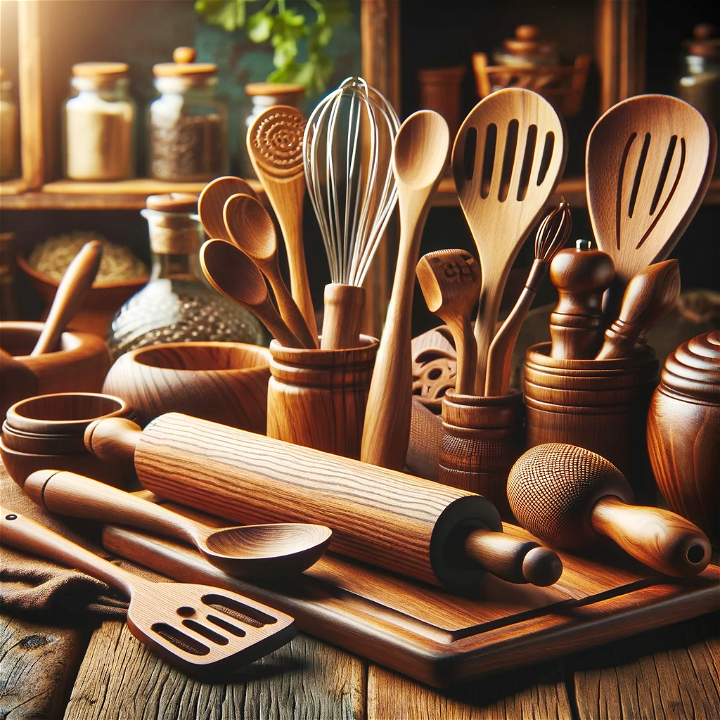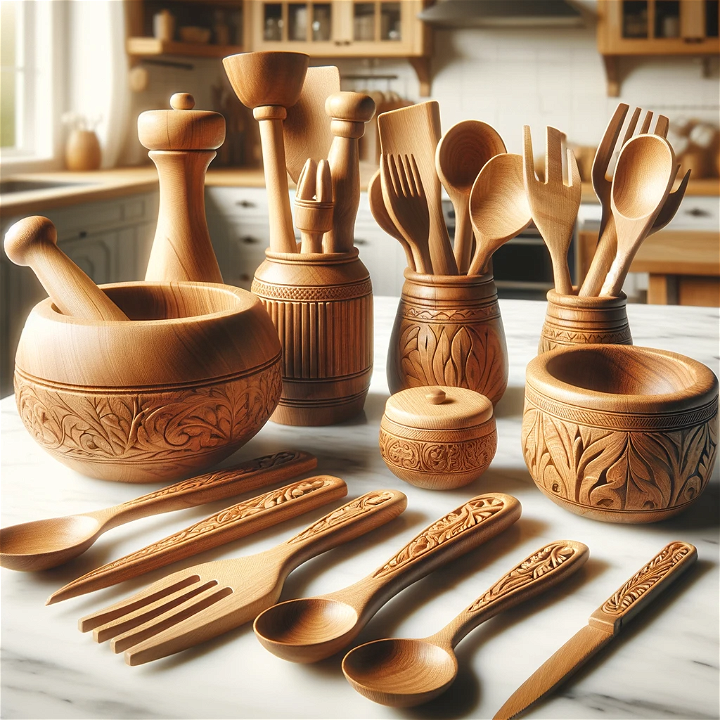Many cultures around the world use wooden bowls, spoons, cutting boards, and kitchen utensils exclusively. They may utilize very simple-looking tools that are functional and yet still aesthetically pleasing, or they may use ornate wooden items that demonstrate incredible craftsmanship. In many of these cultures, wooden kitchen tools are simply a part of their history that they cherish and continue forward from one generation to the next. Beyond these considerations, there are certain benefits to using wood in the construction of kitchen tools, and we want to share some of those advantages with you here. If you make your own wooden spoons and other utensils, then this article may be very helpful.

No Heat Conduction
If you use metal kitchenware, you know how quickly those tools can conduct heat. Try stirring a pot of soup on the stove with a metal spoon, and you will soon need a hot pad to protect your hands from the heat. But wooden spoons and other wooden utensils will not conduct heat. Even if the wooden tool is left sitting on top of a hot pot or left down inside the pot for a while, it will not become hot. There is no need to use a hot pad with it, so it is much safer for kitchen use, and you may prefer wooden utensils when teaching your children how to cook. Wooden utensils prevent burns in the kitchen.
Gentle on Cookware
Try using wooden utensils when cooking to prevent scratches and scuffing on your metal cookware. Because wood is soft, it will not scratch up metal items, like pans and pots. You have to be careful when using nonstick pans, since they can scratch easily, and it’s advisable to use wooden utensils with these for their soft quality. That way, you can even scrape your metal pans down with the wooden spoon or spatula and not cause any scratches. Plus, they won’t make loud, annoying scraping sounds when you use them.
Incredibly Durable
Wooden utensils are also very hardy and should last a long time. If they are made of quality wooden materials and are made from a single piece of wood, they will resist damage and wear and tear. They should not crack or corrode easily. Even under high heat conditions and when used vigorously to scrape at encrusted pots and pans, wooden utensils can stand up to this abuse and handle the work well.
Non-Reactive Materials
Wood will not react to heat or other elements and substances in your kitchen. You can cook whatever you like at whatever temperature you like and not worry about chemicals leaching from the wood into your food or onto your cooking utensils. This non-reactive material is safe to use even with foods that contain acid and that would normally cause other materials to break down and seep off chemicals.
You can safely use wooden utensils no matter what kind of food you are cooking. If you are worried about food safety and limiting the chemicals in your kitchen, be sure to use natural cleaning chemicals. Or, if you hire a part time maid to work in your kitchen, ask them about natural green cleaning. They should be able to accommodate you. Chemicals are more widespread today than ever before, and you have to be vigilant about the cleaners you use and the kinds of cooking implements you buy.
On this note, wooden utensils are very sanitary. They do not house bacteria very easily, so they can be used over and over again without fear of carrying foodborne illnesses. There are several types of wood that actually repel bacteria, like pine, for example. These kill many germs on contact, making them superb for kitchen use and for your peace of mind.
Naturally Biodegradable
Wooden utensils are made from natural substances. Though they may have glossy finishes, those treated coverings will break down over time and not stick around in the environment. Wood is a biological material that decays naturally in time, and you can be more environmentally conscious by purchasing and using wooden tools rather than metal or plastic ones.

Designed for Easy Handling
Most wooden utensils have gentle, rounded edges rather than sharp sides. That makes them easy to handle, and they can be very gentle on your hands even after hours of use. If you find metal spoons and cooking utensils to be too rough on your hands, try switching over to wooden ones.
Beautiful Craftsmanship
Some wooden utensils are very simple, but many of them have lovely designs which are curved into the surface of the spoon, bowl, or other tool. They can add a touch of class and refinement to your kitchen, and you can admire their beauty as well as their functionality.
On the Downside
There are a few disadvantages to using wooden kitchen utensils, and we think you ought to know about them. As great as wooden spoons, spatulas, and bowls are, they do have some limitations and drawbacks.
First of all, you cannot cook in wooden bowls, since they cannot be placed over an open flame. You can work with wooden spoons and other units in metal cookware that is on an open flame, but the wooden utensils cannot come into contact with the flame or they will be damaged and may even catch on fire.
You may have some difficulty cleaning your wooden utensils. Water can cause the wood to decay and rot, especially if the wooden utensil has not been specially treated for water resistance. You cannot leave wooden items to soak in a sink-full of soapy water like you would with metal and plastic cookware. Instead, they should be scraped clean and then washed with as little water as possible. Then, the wooden utensils should be dried out naturally and as quickly as possible.
If your wooden tool is damaged, it may be unusable or uncomfortable to hold. Wooden tools can split and splinter, creating rough, sharp surfaces that are hard to hold onto. Once a wooden utensil is damaged it may no longer be usable and will likely be impossible to repair at low cost.
